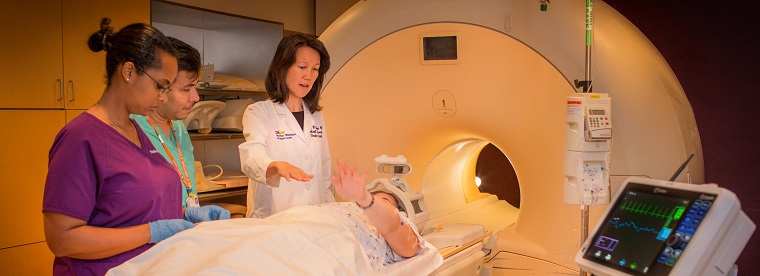What comes to mind when you think of clinical trials? If you’re like most people, you think of cancer or other longer-term diseases in which people have time to weigh the benefits and risks before signing the forms to participate.
This isn’t how it works when it comes to clinical trials for stroke – at least when initially treating a stroke.
Strokes typically strike out of the blue. Because time is of the essence, we have to give patients and families a crash course in stroke treatment. We’re sensitive to the fact that our patients and their loved ones must absorb a lot of important information very quickly. But we also know that at times a clinical trial may be a patient’s best chance for recovery – and there’s limited time to decide whether to participate.
Hopefully, you’ll never need to put this information to use, but if you or a loved one is at risk for stroke, take time to learn what questions to ask about clinical trials in the short time you have to make a decision.
Questions to ask when considering a clinical trial
We participate in observational trials as well as trials in early and later phases through our National Institutes of Health (NIH)-funded stroke clinical research programs: NIH/NINDS Intramural Stroke Program and NIH StrokeNet: Stroke National Capital Area Network for Research (SCANR).
We conduct trials at every stage of stroke:
- Acute, or immediately after it happens
- Rehabilitation
- Preventing another stroke
Read more about our current and completed stroke trials and studies or find additional stroke-related clinical trials.
In trials for acute stroke, the decision to participate needs to be made quickly. When it comes to rehabilitation and preventing another stroke, you may have some time to research and think through your options. We know you’re getting a lot of information thrown at you in a short time, but there are a few things you should ask and understand before you decide – whether for yourself or a loved one.
What’s the standard treatment?
There are two main types of stroke:
- Ischemic, in which a clot blocks blood from reaching the brain
- Hemorrhagic, in which a blood vessel bursts and leaks blood into the brain
Treatment for either type of stroke may include a clot-busting drug, such as tissue plasminogen activator (tPA), which is the gold standard for treating ischemic strokes. We also may be able to physically remove the clot or repair the vessel to prevent further bleeding.
Why would a clinical trial be better than the standard treatment?
Some people may not be good candidates for standard stroke treatment. For example, tPA must be given within four-and-a-half hours of the onset of the stroke, and clot retrieval for a subset within six hours of the onset of the stroke, as the bleeding risk and other potential complications may outweigh the potential benefit after that time for most patients. In these cases, a clinical trial may be your best or only option.
In some situations, a clinical trial may offer a better chance of recovery than the standard treatment, and your doctor should explain why this may be.
What are the risks and benefits to participating?
Every treatment has potential side effects. Ask what these may be in the short-term and the long-term. Also, learn how the possible risks and benefits compare to those of the standard treatments.
The benefits can range from the potential for a better recovery or, in the case of an observational study in which you’ll get standard treatment, contributing to and advancing our knowledge of stroke care.
Advocate for yourself and loved ones
Unfortunately, if you’re told that you or a loved one is not a candidate for standard stroke treatment, there’s no time to go home and Google “clinical trials.” However, that doesn’t mean there’s nothing you can do. You’re your best advocate.
First, research your local hospitals to learn what stroke resources they offer in the way of specialists, treatments and clinical trials. Ask which facilities they turn to for additional guidance.
If you’re taken to a hospital that doesn’t offer clinical trials, ask the doctor if there is one available in the greater area that you may be eligible for. Our StrokeNet clinical trials network includes multiple hospitals in the mid-Atlantic region, so depending on the trial, you may be closer to a participating hospital than you think.
We want to help as many stroke patients as possible, but we can’t help if we don’t know who they are. We rely on emergency medicine doctors to notify us about potential candidates – and quickly. We are developing a process through our telestroke program to expand clinical trial access to stroke patients at other hospitals. But for now, asking about potential trials in the area may prompt the doctor to give us or another facility a call.
While you likely will never be fully prepared for the shock of having a stroke, having some knowledge of clinical trials in the back of your mind may make an emergency situation a little less stressful.
Request an appointment to learn more about our stroke clinical trials and to discuss whether you or a loved may be a candidate for one.
Request an Appointment

